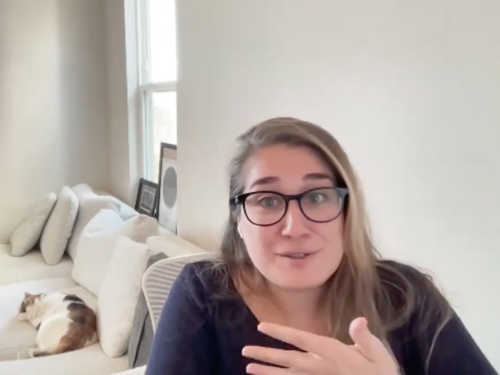To kick off our first Speaker Series event of the new year, Wiki Education brought together a panel of healthcare experts to take us behind the scenes of their own work on Wikipedia and the contributions of their students!
Joined virtually by attendees from across the globe, our panelists explored how the public and healthcare professionals alike turn to Wikipedia for reliable information, the impact of Wikipedia content on patient-physician communications, and the critical need for ongoing improvement of healthcare topics on the encyclopedia.
Whether our search for information is sparked by something we read in a book, watch on the news, or learn from a medical diagnosis, Wikipedia is the first stop we make online, emphasized panelist Maureen Richards, assistant professor and assistant dean at University of Illinois College of Medicine.
“Patients get a diagnosis, they receive a test result, and they Google it,” explained Richards. “If they have been using Wikipedia in all other facets of their life…they’re going to click on it and believe what it says – which means that those of us who have had the opportunity to study [healthcare] have a responsibility to ensure that information on Wikipedia is accurate and well-founded in scientific research.”
Richards, who first incorporated a Wikipedia assignment into her courses in 2020, noted her appreciation for how the project provides her medical students with the opportunity to practice the language of research and to learn how to synthesize primary literature for a greater audience.
Like Richards, professor Amin Azzam assigns coursework on Wikipedia to his own medical students. Azzam underscores the critical, real-world nature of the work to his classes by encouraging them to explore the readership trend on any health-related Wikipedia article.
“When you look at article traffic statistics, there’s always a five peaks and two valleys pattern that reoccurs,” noted Azzam, who challenges his students to explain this pattern. “It’s weekdays and weekends, because exactly as Maureen said, people get diagnoses, and then they go home and read about them on Wikipedia. It really is incumbent upon us to make it as accurate as possible.”
Lending her perspective as a new Wikipedia editor herself, physician and policy researcher Gabriela Alvarado echoed the assertions made by her fellow panelists. As Alvarado explained, the platform’s accessible nature is a significant draw for those seeking answers to healthcare questions. She noted Wikipedia’s understandable language, clear visual formatting, and of course, one very simple but powerful characteristic of accessibility – it’s free to read.

“My family members will search for something and a paywall comes up on a journal,” shared Alvarado, who participated in a Wiki Scientists course focused on improving reproductive and women’s healthcare content. “The average person who isn’t affiliated with a school library can’t pay $50 for each academic journal they want to read. It’s a recurring conversation that academics have with themselves – are we screaming into this echo chamber? Why are we doing the work that we’re doing, who’s actually reading it, and who are we serving with our research?”
Just like Alvarado, health researcher Izidora Skracic was compelled to join the Wiki Scientists editing course to help improve public access to critical healthcare information. While Alvarado created a new Wikipedia article on breastmilk storage and handling, Skracic lent her efforts to enhancing high-traffic articles including Unintended pregnancy, Intrauterine device, and Contraceptive implant.
When asked for her best advice for new editors, Skracic recommended newcomers start small and work their way up to large-scale editing.
“In order to start, pick one sentence somewhere on any Wikipedia article that you’re reading, and just say, I’m going to make this sentence better – whether that means adding a citation, adding a second part of a sentence, or just adding more updated information,” said Skracic. “And as you build confidence, go bigger.”
Catch up on our Speaker Series on our YouTube channel, including “The Experts Behind the Edits: Expanding public understanding of healthcare,” and join us for our next webinar tomorrow, February 18!
Beyond the Classroom: Student editors improve Wikipedia
Tuesday, February 18 (10 am PST / 1 pm EST)
REGISTER NOW
Interested in incorporating a Wikipedia assignment into your course? Visit teach.wikiedu.org to learn more about the free resources, digital tools, and staff support that Wiki Education offers to postsecondary instructors in the United States and Canada.
